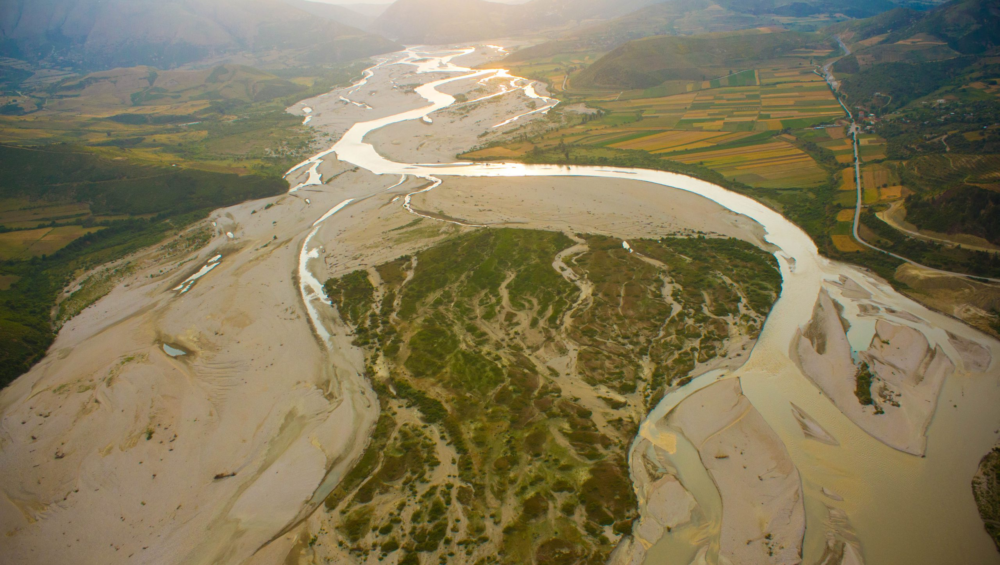By Olsi Nika / Gazeta Shqiptare
The construction of HPPs in Albania took an almost epidemic surge during the years 2010-2013 with the support of the Albanian government of that time, where a total of 499 concessions were granted, 113 of them are inside Protected Areas (according to AKBN). This means that in proportion to the approximately 3,000 km of river length that our country’s hydrographic network has, it is estimated that a hydropower plant will be built in every 6 km of flow. The picture is absolutely apocalyptic when this government initiative was not supported by any strategic study of the environmental impacts that the construction of these HPPs could have. On the other hand, the fact that up to now not even 30% of them have been completed, even though they have exceeded the deadlines provided in the concession contracts, casts a shadow of doubt on abuses, history of corruption and fraud in many cases.
In fact, the energy sector is not the main contributor to our country’s GDP, and the construction of these HPPs would not add more than 10% to it, but the energy production from these would offset that part of the energy (approx. 38%) that we currently lose in the distribution network (Ministry of Energy and Industry). But is it worth it to find solutions by sacrificing all the rivers just to compensate for the loss in the network?
In many cases, the construction of HPPs has generated conflicts between the local community and the concessionaire companies. In this prism, it is clear how little these companies have received the agreement of the local community, but on the other hand, what is more important is the fact that, in addition to the environmental consequences, the construction of these HPPs without being based on a Strategic Master Plan brings and negative social consequences that have often ended with popular revolts.

Even the Vjosa river, in the south of our country, could not escape from this epidemic. Even the HPP of Kalivaç was among the first to have a concession contract (since 1997). And then the plans to exploit the Vjosa for hydropower would steadily increase until they reached an alarming figure of 31 HPPs planned across the Vjosa catchment. (8 of them in the course of the Vjosa and 23 small ones in its branches such as Bënça, Lengarica, Çarshova, Drinos, etc.)
However, the Vjosa river still flows freely from the source to the mouth and it is not for nothing that it is considered the last “wild” river in Europe due to its natural state. A unique river that has remained almost untouched in its 270 km free-flowing from source to estuary…but how long will it continue to be so?
In the last press statement, Prime Minister Edi Rama said: “We have another plan for Vjosa, that of the natural park. And, of course, we cannot turn back the hydropower plants that are under construction, but from Kalivaçi onwards we will not allow any more hydropower plants to be built”.
This statement calls into question the future of Europe’s last wild river. “If the Albanian government allows the construction of the Kalivac dam, all the hydromorphological and ecological integrity of this river will be lost. In fact, it is precisely this integrity of the natural continuity of the river’s flow that makes Vjosa unique in all of Europe. Therefore, if this is lost as a result of the construction of even a single dam, as may be the case of Kalivac, we can no longer support the idea of a Vjosa National Park. On the contrary, at least in my eyes, only the upper part of Vjosa is not worth becoming a National Park.
We have many rivers in Europe that are in very good condition in their upper reaches, some of them are even Protected Areas, but in no single case is there a river among them that flows in its natural bed. throughout its length. This is the value that Vjosa still has and therefore it can be the first park of a natural river in the entire continent. Declaring only its upper course as a National Park not only no longer constitutes a uniqueness, but it will be very difficult to explain to the international public how the last “wild” river of the continent is first sacrificed and then a National Park is declared in that remaining segment. Not only will this not sound good, but it can also cause a big international reaction. Vjosa is now internationally known,” says river specialist Ulirch Eichelmann from RiverWatch.
Meanwhile, hundreds of residents of the Vjosa valley, starting from Çarshova to Selenica, have signed a petition addressed to the country’s prime minister, where they demand the declaration of Vjosa National Park and the cancellation of HPPs in its entire watershed.
We welcome the good will as well as the concrete initiatives of the government in terms of protecting the environment where, for the sake of truth, until now these have been secondary issues. We also understand the difficulty of undoing many unjust decisions regarding HECs which undoubtedly have their financial cost that will inevitably fall on the backs of Albanians. However, we believe that when it comes to compromising our natural heritage, which in itself constitutes the basis of economic development in the long term, politics in certain cases should not make compromises in making decisions. And Vjosa’s case is absolutely like that. Setting the “borders” taking Kalivac as a point of reference actually does nothing but divide the river into two parts; where one will be sacrificed for hydropower production and the other will be declared a National Park. This in fact is undoubtedly a compromise, but which is built on the logic of dividing this ecosystem into two, which has its greatest natural value, precisely the continuity, the natural flow that potentially gives it the attributes of an incomparable National Park with others in Europe. Therefore, we believe that in the case of Vjosa, it would be better to pay the financial costs of canceling the concessions today rather than forever!
On the other hand, during the tour of meetings with the community of the Vjosa valley, we have found that, from Çarshova to Novoselë, the community has expressed itself in favor of the National Park along the entire length of the river without establishing any border or reference point. Even the calculated solidarity has been clearly noticed when residents from all over the valley have joined the community of Benca to protest against the construction of HPPs on this river demanding their cancellation as they are destroying the unique ecosystem of the river which they consider as the heart of the future National Park.
The legal package that the government is preparing to not allow industrial activities in Protected Areas is certainly a good initiative, but what would really save our hydrographic network would be the undertaking of a Strategic Master Plan that would determine where where hydropower plants “can” and “shouldn’t” be built. And obviously, until the end of this evaluation, which should have been done before the concession permits were granted, the fairest decision would be the suspension of all HPPs that have not been completed.
At the end of his speech, Prime Minister Edi Rama stated that: “…we are so willing to penalize all those who from within the state try to benefit by making agreements with crime or with criminals of all levels, in this case with environmental criminals, for whom, as I said, there will be a special package with all the right medicines so that this environmental criminality ends…”
But will this “package of medicines” proposed by the government be able to save the blue heart of Europe and especially the river Vjosa and its tributaries from the HPP epidemic?
The article published in the Gazeta Shqiptare/BalkanWeb can be found here








